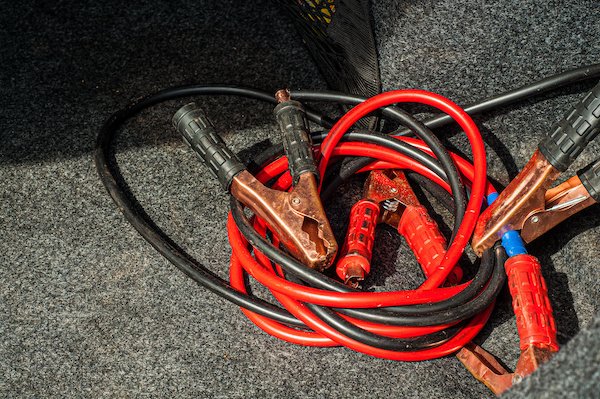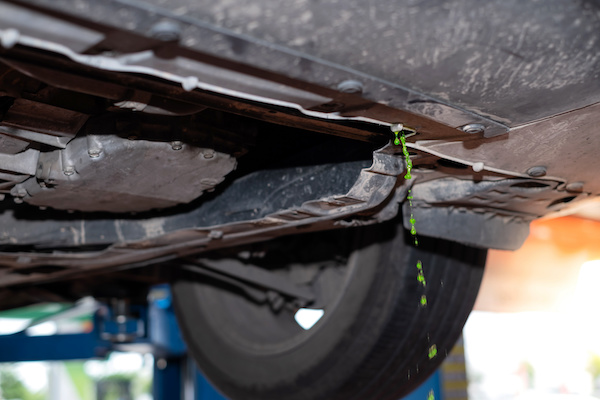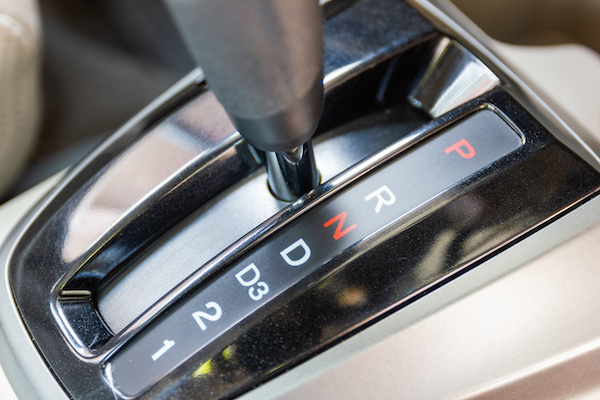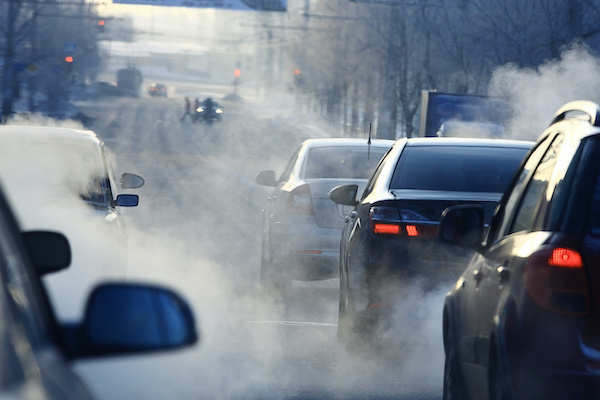Posted on 12/20/2021
.jpeg)
There are many reasons why your car engine might be misfiring. It can be something as simple as a sensor or be much more complicated, involving the internal engine or electrical circuits. Regardless, it is vital to get your problem diagnosed and repaired by a professional mechanic. The X-tra Mile Auto Care team can give you a quick turnaround and prevent the damage from spreading to other important components. Most Common Causes of an Engine Misfire Unfortunately, there are many potential causes in why an engine is misfiring. Here are some of the issues that have been diagnosed in our auto repair shop in Stillwater, OK: Ignition system problems: When most people hear the term misfire, they immediately assume it is due to worn-out spark plugs. They don't realize that the spark plugs are only a tiny part of the ignition system—there are other parts, including the crankshaft position sensor, coils, and wiring. Air and fuel delivery difficulties: You may know that air ... read more
Posted on 11/17/2021
.jpeg)
Most motorists know when to get their oil change done, but what about power steering fluid? Power steering is one of those fluids that is often overlooked or forgotten by most people. However, it is a hydraulic fluid that is necessary to power your steering system. Similar to your other essential fluids, changing out your power steering fluid is a necessary maintenance practice. Though your power steering solution doesn't burn off with combustion like oil, it can get dirty, contaminated, and become ineffective with use. When the power steering fluid gets filthy, it adds tension and stress to the power steering pump. In severe circumstances, your entire steering system can fail with inadequate power steering fluid. 3 Signs of Bad Power Steering Fluid Dark or Contaminated Fluid - Open the hood and use your dipstick to inspect your power steering fluid. The color of good quality power steering fluid should be red. The solution itself should be clean and free of contaminants. If you ... read more
Posted on 10/11/2021

The fall semester is in full swing, and if you are a commuting college student, we hope you've adjusted to the parking situation by now. Operating a car on a chaotic campus can be stressful, so preparing yourself for the worst situations is necessary. Mechanical car problems should be the least of your concerns when you have classes to attend and exams to study for. We've made a list of items to pack in your car to (hopefully) ease the headaches of being a college student: Variety of Chargers - For Millenials and Gen Z, a dead phone or computer is equivalent to the end of the world. We recommend packing various charging devices to ensure you can get that extra juice throughout the school day. Jumper Cables - These bright-colored cables are a necessity for all drivers, not just students. You never know when you may encounter a dead battery at school or any other place away from your apartment or home. First Aid Kit - This is pretty much self-explanatory, but you can nev ... read more
Posted on 9/13/2021
.jpeg)
Even though it's September, most Stillwater residents still heavily rely on our vehicle's air conditioning. Temperatures still rise well over 80 degrees Fahrenheit, and our first instinct is to crank up the A/C. Sometimes, when you crank it up high enough, you may catch a foul odor resembling dirty gym socks from your A/C cent. A musty funk from your A/C is definitely not normal. Usually, when this happens, it means that you've got an excessive buildup of foreign substances like mold, fungus and/or bacteria in your unit. YUCK! How To Get Rid of the Odor Since this putrid smell coming out of your A/C vent is relatively common, there are specific steps you can take to get this stench out of your car quickly. Step 1 – The first step is to use a clean air evaporator cleaner. This method is a foaming detergent that will seep into your car's evaporator and attempt to break down the mold and other foreign substances that are causing the smell. This clean ... read more
Posted on 8/11/2021

Over time, your vehicle's nuts, bolts, rubber gaskets, and other seals can become loose or defective. As a result, you may experience leakages of your car's essential fluids. A minor leak may not seem like a huge deal at first, but it is not something you want to disregard. After all, a small puddle can turn into a significant problem down the road. With this in mind, here are some things you will want to do as a responsible vehicle owner whenever you notice any fluid leak. Step 1: Identify the Fluid First, we encourage you to identify which type of fluid it is before rushing to the mechanic. You can use your senses to narrow down what kind of fluid it may be. Usually, the smells and colors will often tell you a lot about where the problem comes from. If it's a fuel leak, then you will want it addressed as soon as possible. If you have trouble identifying the liquid, take your vehicle to X-tra Mile Care pronto. Step 2: Don't Ignore It Whether it is e ... read more
Posted on 7/9/2021

A vehicle’s exterior lighting is one of the most important safety features of a car. The headlights provide the primary lighting for night driving, while brake lights communicate to other drivers when you’re stopping or slowing down. For these two reasons alone, these sets of lights should always be functioning whenever operating your vehicle. Luckily, headlight maintenance is relatively easy to manage, and even major repairs don’t take that long. Here are some of our top tips for headlight and brake light maintenance for your car: 1. REGULARLY INSPECT THE LIGHTS The first step to light care is to do frequent inspections of the lights. It can be as straightforward as a walk-around where you check the lights for any failures, dimness, and cracks. For your brake lights, it can be beneficial to ask someone to take note while you step on the brake pedal. If it looks filthy, out of order, or needs replacing, be sure to take action immediately. 2. POLISH ... read more
Posted on 6/18/2021

The neutral gear is most likely the least used gear for drivers, yet it serves such an essential function. It is especially true for manual transmission vehicles as the vehicle must always be in neutral first. However, most automatic transmission drivers rarely depend on being in a neutral position. While in neutral, the gas pedal does not accelerate the vehicle, and no power from the pedal is transmitted to the wheels. Since this position is rarely engaged, when should you shift your car into neutral? Did you know that neutral isn't necessarily considered a gear? It is just a state where no gear is engaged at all, hence the name - neutral. Here are the four situations where you should switch your vehicle into "N". During a Drive-Thru Car Wash If you are a frequent car wash goer, you know that most drive-through car washes have an automatic system that requires you to be placed in neutral gear. Putting your car in that position allows your vehicle to mo ... read more
Posted on 5/17/2021
.jpeg)
Regular maintenance on a vehicle's braking system is critical. Performing scheduled maintenance on rotors, brake pads, and brake fluid is essential to healthy performance. Without regular maintenance, a catastrophic failure is likely. Fortunately, one component of that equation, brake fluid, is a cinch to test yourself. It's a breeze to test your brake fluid at home using brake fluid test strips. As needed, a full brake fluid flush should be professionally done regularly on any vehicle. Brake fluid is a liquid chemical solution that is critical to the performance of hydraulic braking systems. When you press the brake pedal, the brake fluid exponentially increases pressure on the braking system. Each vehicle is designed with a specific type of brake fluid in mind. Utilizing the correct type of brake fluid is imperative. Adding the incorrect fluid can have long-term detrimental effects on a vehicle's continued performance. Brake fluid should also have a high boiling po ... read more
Posted on 4/21/2021

The long and short of it: yes, your driving habits affect your vehicle's maintenance schedule. Although driving styles differ, some will necessitate more frequent maintenance. Have a look at some examples. Quick acceleration Speeding places strain on your vehicle's engine, transmission system, and wheels, leading to quicker wear and tear. Additionally, rapid acceleration will increase your fuel consumption and further negatively impact your budget. The solution is to accelerate gradually and maintain a constant speed. Riding the brake Some drivers apply constant pressure to the break, ever so lightly, to reduce speed. Continuous breaking will negatively impact your brake's lifetime as well as the longevity of your vehicle's brake fluid. The outcome will be quicker wear and even failure to brake. It is better to brake in short bursts or reduce your overall speed by changing gear to save the brakes and prevent overheating. Shifting without stopping Shifting gear w ... read more
Posted on 3/15/2021
.jpeg)
Driving cars for over 200,000 miles isn't unusual nowadays. The average age of vehicles on the road is approaching twelve years. There are advantages to keeping a vehicle for a long time, including money and environmental issues. Besides, that vehicle may be your favorite of all time. Following are three tips on how to keep your vehicle going strong for 200,000 miles and more. Buy a Reliable Vehicle Start with a reliable vehicle and it will be easier to keep it on the road. Many resources rank both new and used vehicles on safety and reliability but you can also trust your instincts. Does the interior have an odd smell? Are there visible rust or dents? You may want to take the vehicle to a trusted mechanic to look for signs of wear and tear you may have missed. Doing your due diligence before purchasing a vehicle will pay off in the long run. Maintenance Every vehicle comes with a maintenance schedule that should be followed. Perhaps you want to perform some of the maintenance ... read more